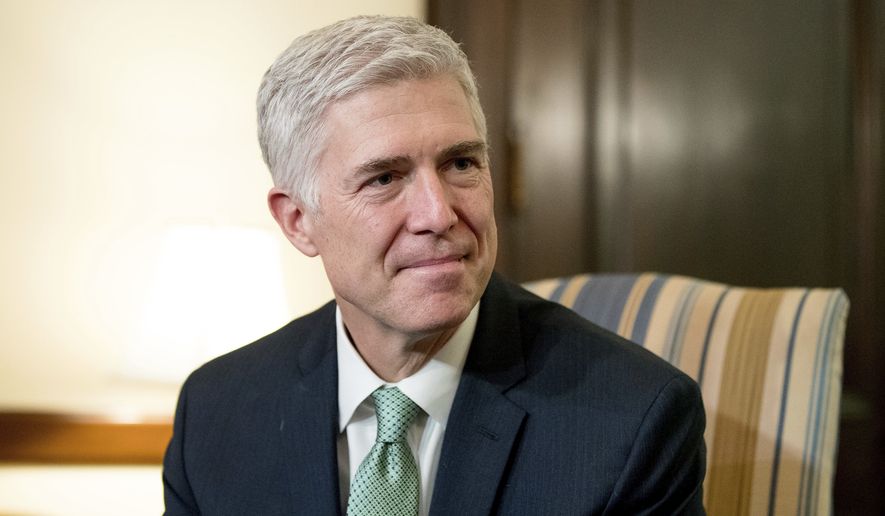Judge Neil Gorsuch’s time in the Justice Department is coming under increasing scrutiny, with senior senators and advocacy groups demanding access to his work as principal deputy associated attorney general before the Judiciary Committee takes action on his nomination to the Supreme Court.
Sen. Dianne Feinstein, the ranking Democrat on the panel, fired off a letter to the judge last week asking whether he worked on 10 high-profile cases involving U.S. torture policy, partial birth abortion, warrantless wiretapping and Guantanamo Bay detainees.
She and committee Chairman Charles E. Grassley earlier this month also asked for the Bush Presidential Library to release any documents it has on Judge Gorsuch’s earlier nomination to the 10th U.S. Circuit Court of Appeals, and any emails he may have sent to the Bush White House in 2005 and 2006, when he was in the Justice Department.
Meanwhile, an outside advocacy group has filed an open-records lawsuit trying to get access to Judge Gorsuch’s work while at the Justice Department, after the department failed to respond in time to a Freedom of Information Act request.
Gabe Roth, executive director at Fix the Court, told The Washington Times there isn’t anything particular that he expects to find in the documents, but he pointed to the possibility of war on terror issues, such as warrantless wiretapping, being discussed during Judge Gorsuch’s tenure.
He suggests this could impact whether or not Judge Gorsuch would need to recuse himself from cases that come before the high court.
“The conflict check system is not perfect with the Supreme Court. Three times in the last year and a half they’ve missed a conflict of interest, so if they’re not doing a good enough job policing themselves, then I think it’s our role as an outside group to help,” said Mr. Roth.
His group is seeking Judge Gorsuch’s correspondence, performance reviews and any complaints or reprimands he may have gotten.
Judge Gorsuch did a one-year stint as principal deputy to the associate attorney general in the civil division beginning in 2005 — a time when the department was facing questions over the firing of U.S. attorneys for not being loyal enough to then-President George W. Bush.
Meanwhile an inspector general’s report from 2008 found evidence that the department’s Civil Rights Division was using ideology in hiring decisions, which was prohibited.
“I would be very curious to know if Gorsuch had a role in any of that,” said Billy Corriher, deputy director at the liberal Center for American Progress.
There is a precedent for releasing some information from Justice Department files ahead of Supreme Court hearings.
The department released thousands of documents ahead of Justice Samuel A. Alito Jr.’s confirmation hearing, and released documents about eventual Chief Justice John G. Roberts Jr.’s time at the department in the Reagan administration in 1981. However, records pertaining to Chief Justice Roberts’ time as principal deputy solicitor general at the DOJ under President George H.W. Bush were not released.
The Justice Department declined to comment on what it may release.
Brian Rogers, executive director for the conservative America Rising Squared, is defending Judge Gorsuch, dismissing Fix the Court’s litigation, calling the organization “a partisan political front-group founded by a Democrat operative and bankrolled by big money liberals.”
“The fact that Fix the Court is filing a lawsuit for records on Judge Gorsuch that they never sought from Judge Garland — President Obama’s nominee last year — tells you it’s a political fishing expedition, not a legitimate effort for transparency,” said Mr. Rogers.
Mr. Roth said he considered filing a FOIA request for President Obama’s Supreme Court nominee Judge Merrick Garland last year, but decided not to after Senate Republicans vowed not to hold a hearing or a vote on him.
• Alex Swoyer can be reached at aswoyer@washingtontimes.com.




Please read our comment policy before commenting.